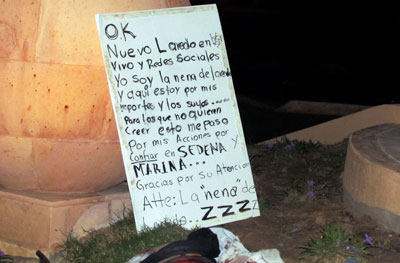
Speak Justice campaign fights impunity in press murders
The tortured and decapitated body of 39-year-old María Elizabeth Macías Castro was found on a Saturday evening in September 2011. It had been dumped by the side of a road in Nuevo Laredo, a Mexican border town ravaged by the war on drugs. Macías, a freelance journalist, wrote about organized crime on social media under…

Attacks on the Press in 2011: Preface
Technology has democratized news publishing, rattling regimes that see their survival dependent on control of information. Video footage of repression from Burma to Syria to Egypt dramatically illustrates the benefits of Internet platforms and social media. Yet the Arab uprisings of 2011 also demonstrate the urgent need for providers and users of digital tools to…

Attacks on the Press in 2011: Abolishing Censorship
Even as trade and new systems of communication turn us into global citizens, the information we need to ensure accountability often stops at national borders. New platforms like social media are valuable tools, but the battle against censorship is hardly over. By Joel Simon

The press silenced, Nuevo Laredo tries to find voice
You don’t notice it at first. Not with the people seemingly moving as normal on the sidewalks and the happy recorded music blaring across the plaza in front of city hall to announce the annual cowboy parade. No, at first Nuevo Laredo looks like a regular border town, until the military armored car goes by…

Mexico murder may be social media watershed
María Elizabeth Macías Castro’s killers made sure their actions were understood. In a macabre, carefully orchestrated mise-en-scene, they placed her body in front of a poster with the ominous note. Nearby they left a computer keyboard, with a pair of headphones on her decapitated head.